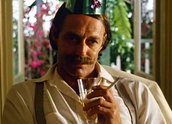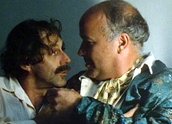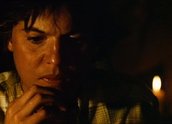


Bliss (1985)
Synopsis
Harry Joy (Barry Otto) dies – for four minutes – after a heart attack. When he is revived, he realises he’s living in hell. His wife Bettina (Lynette Curran) is having an affair with his business partner Joel (Jeff Truman), his son David (Miles Buchanan) sells cocaine and Harry’s advertising agency promotes products that cause cancer. Harry decides to be good when he meets Honey Barbara (Helen Jones), a north coast hippie who dabbles in prostitution. He follows her to her commune in the forest and begins the long process of earning her trust, and his own redemption.
Curator’s notes
Bliss is a key film in the story of Australian movies. It represents a kind of liberation point – a leap away from naturalism and the historical realism of the 'new wave’ of the 1970s, towards the modernism of the 1990s. To say it was ahead of its time is an understatement – the boldness of its metaphors and the sharpness of its satire were too much for many people in 1985. Indeed, the film was almost stillborn after 400 people walked out during its first screening at the Cannes Film Festival (another 1,600 stayed). No Australian distributor would touch it, especially once it received an ‘R’ classification, because of the depiction of incest between Harry’s children, David and Lucy (Gia Carides). The classification was overturned on appeal and the film eventually secured a small cinema release. A couple of glowing reviews helped it to find an audience that kept growing. When the film won the AFI Awards for Best Picture, Best Direction and Best Adapted Screenplay for 1985, Bliss had become an art-house hit. It played for six months in Sydney and around the country.
It’s based on a novel by Peter Carey, who co-wrote the script with Ray Lawrence. Both had worked in advertising, which is presumably why its critique of that industry is so trenchant. Lawrence had not directed a feature before, and the actors were not acknowledged stars, which made it difficult to finance. It was eventually made for about $3.3 million, but Lawrence is on record as saying he doubts it would ever get financed now.
Nevertheless, it remains a completely original kind of Australian comedy, with a surreal and sardonic sense of humour. Lawrence’s poetic imagery is startling, partly because he takes great risks. The film is gleefully vulgar but very sophisticated, irreverent and yet full of poignancy. It pointed the way for films like Sweetie, which further developed a style of Australian surrealist humour four years later. These are films about what Australia was becoming, not what it once was. If Gallipoli and Breaker Morant represent the high point of historicism in Australia’s newly reborn cinema, Bliss was a rejection of the old – old ways of telling stories, old definitions of the culture, old writing, old certainties. No wonder that some people either didn’t understand it or felt threatened by it – they were meant to be.
The film is now available on DVD in two versions – the original cut shown at Cannes, at 130 minutes, and the theatrical release version, which is 22 minutes shorter. Our clips are taken from the longer version, at the request of the producer, Anthony Buckley.
- Overview
- Curator’s notes
- Video 3 clips

- Principal credits
- Find a copy
- Comments 2
- Add your review



